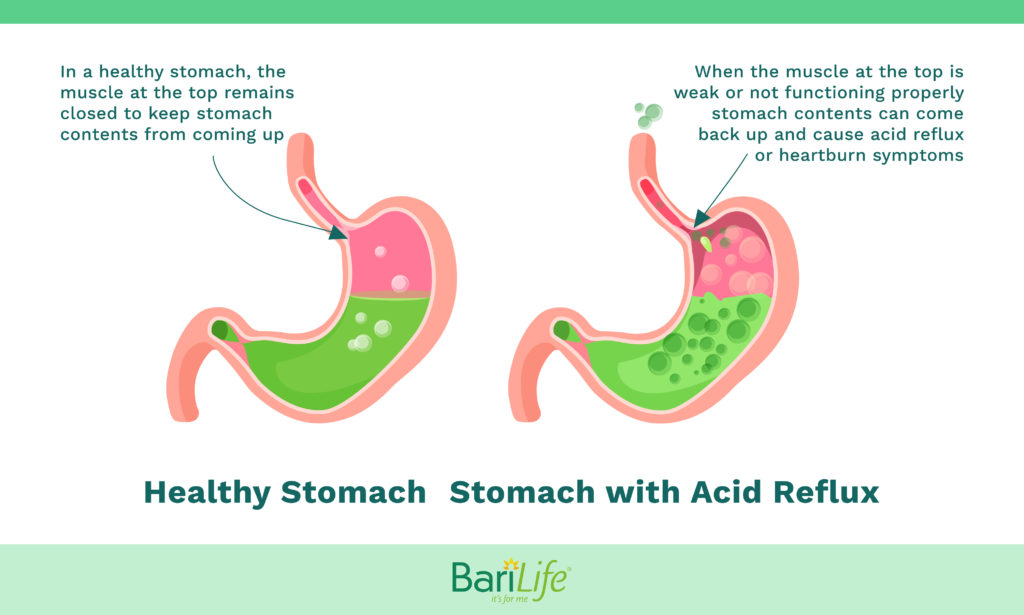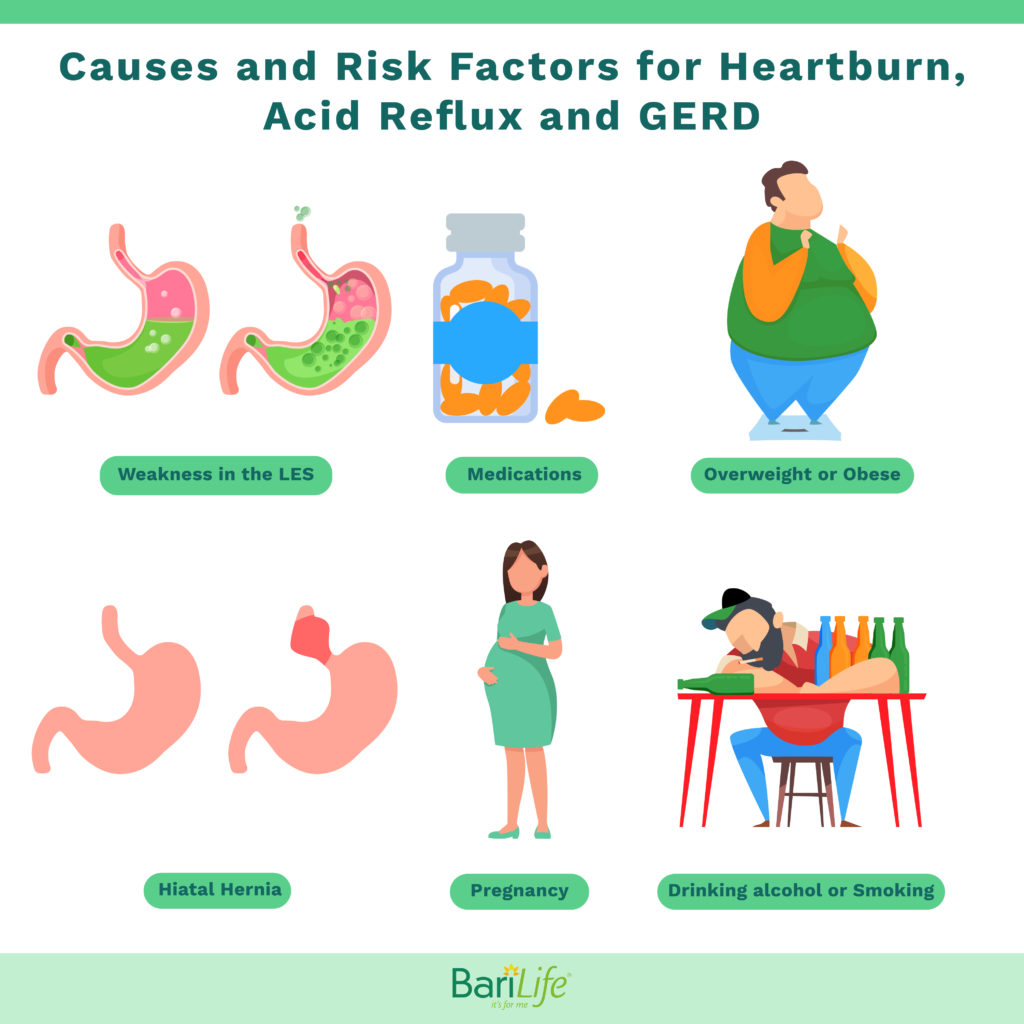ENTER YOUR EMAIL ADDRESS TO UNLOCK
15% OFF
on your first order
Some exclusions apply.
Some research shows that gastric sleeve surgery may increase acid reflux presence. Why?
Gastric sleeve procedures can decrease the pressure around the LES , making it weak. Couple that with increased pressure in the stomach when stomach size is reduced during surgery.
The possibility of developing acid reflux should be considered before consenting to a gastric sleeve procedure .
Gastric sleeve and GERD Management of GERD and acid reflux is a huge focus in the bariatric surgery population. Being overweight or obese may increase your risk of acid reflux, GERD and further complications compared to someone of a healthy weight (3-4).
Here are other reasons why acid reflux may be so prevalent in the obese population:
Pressure on the stomach due to belly fat
Consumption of large meals that lead to stomach distention
Diets high in fatty foods (i.e. fast food, fried food)
Sedentary lifestyle
Presence of hiatal hernia
Effects of acid reflux Acid reflux affects quality of life, sleep and may lead to food aversions. It can also cause inflammation in the esophagus. Cell damage in your esophagus can lead to Barrett’s esophagus, ulcers or cancer.
When a patient continues to have acid reflux (or gets it post-surgery), this adds undue stress to an already overwhelming time.
GERD and acid reflux can be relieved with weight loss, but if weight loss is gradual or never occurs, patients may continue to deal with symptoms months or years after surgery.
Some patients even consider gastric sleeve revision with a Roux-en-Y gastric bypass. Another option is fundoplication surgery where part of the stomach is wrapped around the LES to strengthen it.
It’s important that you and your healthcare team explore all bariatric surgery options and the long-term effects of each.
Gastric sleeve and hiatal hernia While it may seem that gastric sleeve surgery isn’t a reliable way to reduce acid reflux, one small study found that having a gastric sleeve procedure with hiatal hernia repair might be beneficial for GERD.
However, other research indicates that having a hiatal hernia repair with gastric sleeve surgery did not provide significant improvements.
What’s even more important is what happens to the hiatal hernia and GERD relationship after surgery. A 2020 study found that people who experience GERD after a gastric sleeve and hiatal hernia repair may be at higher risk of getting another hiatal hernia.
So, frequent acid reflux symptoms post-surgery should be brought up with your doctor.
How to fix acid reflux after gastric sleeve surgery There are 3 main ways to relieve acid reflux: medications, dietary habits and behavioral changes:
Medications
Dietary habits
Behavioral and Lifestyle changes
You may find that one of these methods works great, but you may get more benefit if you include all methods.
Medications for acid reflux
Antacids neutralize stomach acid. Ask your doctor which antacids are appropriate for you.
H2 blockers work to reduce stomach acid before it forms.
Proton pump inhibitors also work to reduce stomach acid but are usually stronger and faster than H2 blockers.
Dietary habits for acid reflux
Reduce or avoid common acid reflux trigger foods. These include alcohol, tomato products, chocolate, coffee, spicy food, carbonated drinks, peppermint, greasy foods and fatty foods.
Reduce or avoid personal trigger foods that you’ve noticed give you trouble.
Avoid drinking liquids with meals or snacks. Eat your meal and then wait at least 30 minutes before consuming liquids.
Eat small meals, rather than large meals, to prevent stomach distension
Avoid eating late at night, especially if you’re about to lie down.
Behavioral changes for acid reflux
Quit smoking.
Wear loose clothing.
Avoid lying down right after eating.
Keep your head raised at least 6 inches when sleeping or lounging.
Continue your weight loss eating and exercise plan. Losing weight can help reduce acid reflux.
1-Day meal plan to reduce acid reflux symptoms Your healthcare team may have specific dietary guidelines for you, so do your best to follow them.
Size of meals and drinks: You may need to consume meals 1-2 Tbsp at a time and gradually increase.
Texture: Ask your doctor or Registered Dietitian if you need to blend, puree or dice your food. Texture will be dependent on how long ago your gastric sleeve surgery occurred.
Portions to continue weight loss: Ask for guidance on the exact right portions for your needs.
[box]
Sample Meal Plan to Try Breakfast: Calories per meal: 142
AM Snack & Fluids: Calories per meal: 90
Lunch: Calories per meal: 265
PM Snack & Fluids: Calories per meal: 141
Dinner: Calories per meal: 298
Nighttime Snack & Fluids: Calories per meal: 79
Total calories: 1015 [/box]
While this is only one day’s worth of eating, you can easily see the types of foods that are chosen and you can use this as a nice template to make alterations as you need.
Use the tables we provided in this article to select safe and healthy foods so you can avoid you acid reflux or heartburn symptoms.
In summary Acid reflux, heartburn and GERD can happen to anyone after bariatric surgery. It’s uncomfortable, frustrating and can cause issues down the road. Luckily it can be managed pretty well WITHOUT surgery.
But if surgery is required, it’s been proven to help.
Avoid the specific foods we outlined and make a few behavior changes and you’ll notice a major improvement in your symptoms!

